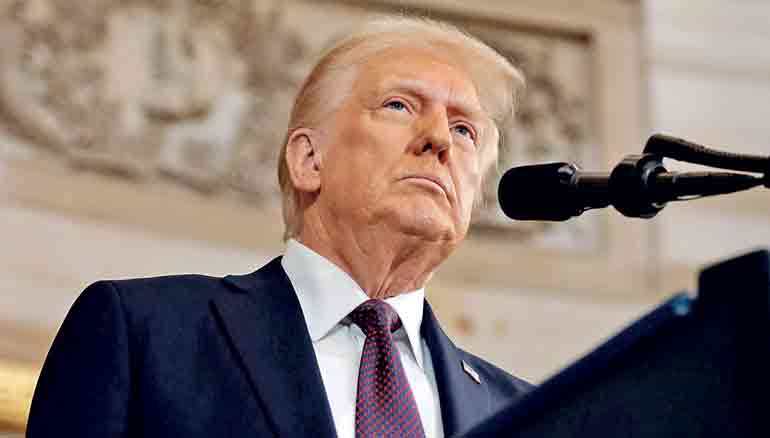Saturday Feb 14, 2026
Saturday Feb 14, 2026
Tuesday, 29 July 2025 01:01 - - {{hitsCtrl.values.hits}}

US President Donald Trump
 The Triffin dilemma, identified by economist Robert Triffin, highlights the conflict faced by a country whose currency serves as the global reserve. To meet international demand, it must supply large amounts of its currency, often through trade deficits, which can undermine confidence in its long-term value while conflicting with domestic economic priorities.
The Triffin dilemma, identified by economist Robert Triffin, highlights the conflict faced by a country whose currency serves as the global reserve. To meet international demand, it must supply large amounts of its currency, often through trade deficits, which can undermine confidence in its long-term value while conflicting with domestic economic priorities.
The supply of US dollars to the global economy is primarily achieved through international trade, requiring the US to run persistent trade deficits. This structural necessity reflects the Triffin dilemma — a conflict between domestic economic goals and the global demand for the dollar as the world’s reserve currency.
Trump’s policy failures
President Donald Trump’s tariff-driven trade policies reflect an inconsistent and irrational response to this paradox. By attempting to reduce trade deficits through protectionism, while maintaining the dollar’s dominance, his approach fails to reconcile the fundamental contradiction at the heart of the dilemma. A strong dollar undermines US manufacturing competitiveness, while a weaker dollar risks diminishing international confidence and investment.
Manufacturing jobs have not only shifted from the US to low-wage countries in the Global South, but also to high-income nations like Europe and Japan, both of which maintain significant trade surpluses with the United States.
Since the 1980s, the dollar’s share of global foreign exchange transactions has surged from under 50% to over 85%, reinforcing its reserve status—but at a cost. US national debt has ballooned from around $ 10 trillion in 2008 to over $ 36 trillion today. This debt accumulation, partly a result of supplying global dollar liquidity, has begun to erode investor confidence. For the first time, US Treasury bonds were recently downgraded, prompting significant capital outflows from the bond market.
Meanwhile, there is increasing pressure to depreciate the dollar to manage the growing debt burden, further weakening its standing as a stable global reserve currency. This situation leaves the US in a precarious position—struggling to maintain the dollar’s international role while facing growing structural imbalances at home.
Despite Trump’s attempts to “have the cake and eat it,” the contradictions of the Triffin dilemma cannot be wished away. The US must eventually confront the long-term sustainability of its reserve currency status.
Dealing with the United States
There is little predictability in US tariff policy, and the future direction of US trade remains uncertain. Sri Lanka must prepare for the repercussions of this volatility and develop contingency plans to withstand potential worst-case scenarios. While Sri Lanka cannot control external economic forces, it can—and must—strategically plan to mitigate their impact.
The United Kingdom has negotiated tariffs of 10% on selected product categories, while Japan is progressing towards tariff rates in the range of 15%. Meanwhile, Canada and the European Union are exploring a coordinated approach in their trade negotiations. Despite the rhetoric of fair trade and sustainability, none of the Global North countries are taking meaningful steps toward establishing a more just and equitable global trading system. Instead, current negotiations continue to reinforce asymmetries that disadvantage countries in the Global South, entrenching structural inequalities rather than addressing them.
It is ultimately futile for Sri Lanka and other Global South nations to compete against one another for access to the US market or to seek favourable tariff treatment through appeasement. The Trump administration’s approach to trade emphasises re-shoring manufacturing to the US, pressuring foreign suppliers to absorb tariff costs by lowering export prices, and encouraging imports of uncompetitive US goods to reduce the trade deficit. These policies do little to address the structural imbalances highlighted and offer no tangible benefit to Global South economies.
Instead of undercutting each other through a race to the bottom on labour costs, countries in the Global South would be far better served by negotiating collectively. By forming a united front, they can advocate for fairer trade practices and establish pricing based on a minimum wage benchmark adjusted for purchasing power parity (PPP). This would help ensure that goods are not priced at the expense of workers’ well-being and would push back against the systemic undervaluation of labour in developing economies. (1)
 The world is at a crossroads—either it succumbs to the dominance of a few powerful nations or it moves towards a more balanced, multipolar order. Sri Lanka must choose the latter path by standing firm against economic coercion, political interference, and financial blackmail. The lessons of the past decade are clear: blind compliance with external demands leads to instability, while assertive sovereignty paves the way for sustainable development
The world is at a crossroads—either it succumbs to the dominance of a few powerful nations or it moves towards a more balanced, multipolar order. Sri Lanka must choose the latter path by standing firm against economic coercion, political interference, and financial blackmail. The lessons of the past decade are clear: blind compliance with external demands leads to instability, while assertive sovereignty paves the way for sustainable development
A coordinated approach based on dignity, equity, and sustainability would allow these nations to challenge exploitative trade dynamics and begin to shift the global economic model toward one that respects both sovereignty and social justice. Competing on quality, innovation, and fair labour standards—not just low prices—should be the long-term objective for the Global South.
The need for Global South solidarity
The recent statements by Brazilian President Lula da Silva highlight the urgent need for a fairer, more inclusive multilateral system—one that does not allow powerful nations to dictate terms to weaker states.(2) Sri Lanka must take a firm stand against such impositions, ensuring that its policies are shaped by its own national interests rather than external coercion.
No single nation, no matter how resilient, can withstand geopolitical bullying alone. President Lula’s call for a renewed commitment to fair multilateralism is a rallying cry for the Global South. Countries like Sri Lanka must unite with others in Asia, Africa, and Latin America to challenge the dominance of a few wealthy nations in global governance.
The existing international financial and trade systems are skewed in favour of the powerful. Institutions like the IMF and World Bank often impose austerity measures that exacerbate inequality, while trade rules are manipulated to benefit industrialised nations at the expense of developing economies. Sri Lanka, having suffered under harsh IMF conditionalities, must advocate for reforms that allow for more equitable economic policies.
Regional alliances, such as stronger ties within SAARC or partnerships with ASEAN nations, can provide collective leverage. By collaborating with countries like Vietnam, India, and Brazil, Sri Lanka can push back against discriminatory tariffs and sanctions. A united front would make it harder for bullies to target individual nations with impunity. (3)
An approach for Sri Lanka
To safeguard itself against the unpredictability of US tariffs — particularly under the Trump administration — Sri Lanka must prioritise building a robust domestic economy that reduces its vulnerability to global market fluctuations. By strengthening local enterprises, both public and private, Sri Lanka can ensure the continuous provision of essential goods and services, even amidst external trade disruptions. Reducing import dependency through domestic production of food, energy, pharmaceuticals, and key consumer goods will not only protect the population during times of global uncertainty but also stabilise foreign exchange reserves. A resilient economy rooted in local demand and inclusive growth will act as a buffer against the economic shocks caused by shifting trade policies in major economies like the US.
Complementing this, Sri Lanka should adopt a strategic industrial policy aimed at driving long-term economic transformation through targeted investments in key sectors. This involves building a resilient domestic economy capable of meeting the country’s essential needs, while also identifying and cultivating industries with the potential to generate foreign exchange. Priority sectors may include textiles and apparel, agri-processing, information technology services, and renewable energy. By focusing on both domestic self-sufficiency and carefully selected export-oriented industries, Sri Lanka can reduce its dependency on external debt and enhance economic sovereignty.
By encouraging value addition, supporting SMEs, and investing in research, development, and innovation, the country can move up the global value chain. Such a policy must also include up-skilling the workforce, improving infrastructure, and creating incentives for both local and foreign investment. A strong industrial base will not only reduce Sri Lanka’s dependence on volatile export markets but also generate quality employment and sustainable economic growth, shielding it from the pressures of erratic tariff regimes abroad.
Asserting independence in a fractured world
The world is at a crossroads—either it succumbs to the dominance of a few powerful nations or it moves towards a more balanced, multipolar order. Sri Lanka must choose the latter path by standing firm against economic coercion, political interference, and financial blackmail. The lessons of the past decade are clear: blind compliance with external demands leads to instability, while assertive sovereignty paves the way for sustainable development.
As President Lula rightly argues, the solution to today’s crises is not less multilateralism but a fairer, more inclusive system. Sri Lanka must play its part in reshaping global governance, ensuring that the voices of smaller nations are heard. By safeguarding its sovereignty, conserving its dollar reserves, and building solidarity with the Global South and strengthening regional trade blocks, Sri Lanka can resist bullying and secure a future defined by dignity and self-determination. The time for passive acceptance is over—the time for resistance has come.
References:
(1) Dhanusha Gihan Pathirana, “Impact of Trump tariffs”, Face-to-Face, Newsfirst TV, 14 July 2025
(2) Luiz Inácio Lula da Silva, “With the world in crisis, many say end globalisation. I say that would be a mistake”, The Guardian, 10 July 2025
(3) Umesh Moramudali, “Southasia and the Trump tariffs”, Himal SouthAsian, YouTube, 21 July 2025
(The writer is co-founder of the Institute of Political Economy (ipe-sl.org) and a former local councillor in London. He can be reached at [email protected].)